Related Research Articles
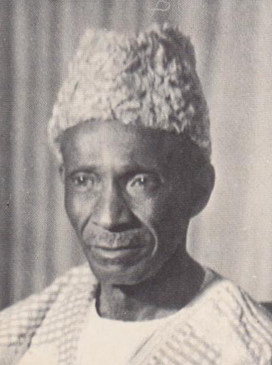
Sir Milton Augustus Strieby Margai was a Sierra Leonean medical doctor and politician who served as the country's head of government from 1954 until his death in 1964. He was titled chief minister from 1954 to 1960, and then prime minister from 1961 onwards. Margai studied medicine in England, and upon returning to his homeland became a prominent public health campaigner. He entered politics as the founder and inaugural leader of the Sierra Leone People's Party. Margai oversaw Sierra Leone's transition to independence, which occurred in 1961. He died in office aged 68, and was succeeded as prime minister by his brother Albert. Margai enjoyed the support of Sierra Leoneans across classes, who respected his moderate style, friendly demeanor, and political savvy.
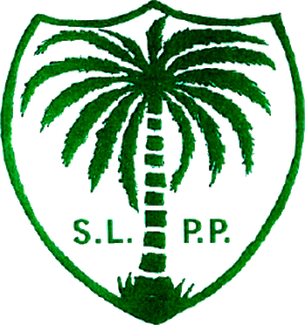
The Sierra Leone People's Party (SLPP) is one of the two major political parties in Sierra Leone, along with its main political rival the All People's Congress (APC). It has been the ruling party in Sierra Leone since 4 April 2018. The SLPP dominated Sierra Leone's politics from its foundation in 1951 to 1967, when it lost the 1967 parliamentary election to the APC, led by Siaka Stevens. Originally a centre-right, conservative party, it identifies since 2012 as a centre-left social democratic party, with a centrist tendency.

Siaka Probyn Stevens was the leader of Sierra Leone from 1967 to 1985, serving as Prime Minister from 1967 to 1971 and as President from 1971 to 1985. Stevens' leadership was often characterized by patrimonial rule and self-indulgence, consolidating power by means of corruption and exploitation.
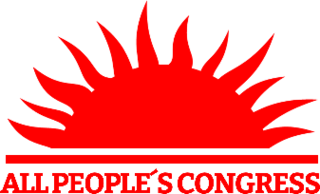
The All People's Congress (APC) is one of the two major political parties in Sierra Leone, the other being its main political rival the Sierra Leone People's Party (SLPP). The APC has been the main opposition party in Sierra Leone since 4 April 2018 when Julius Maada Bio of the SLPP won the 2018 presidential elections, though it maintains a majority in parliament.

Julius Maada Wonie Bio is a Sierra Leonean politician, and the current president of Sierra Leone since 4 April 2018. He is a retired brigadier in the Sierra Leone Army and was the military head of state of Sierra Leone from 16 January 1996 to 29 March 1996, in a military junta government known as the National Provisional Ruling Council (NPRC).
The Ndogboyosoi War, also known as the Ndorgborwusui War, Ndorbgowusui War, Ndorgboryosoi War or Bush Devil War, was an episode of political violence that occurred in 1982 between supporters of the All People's Congress (APC) and the Sierra Leone People's Party (SLPP) in Sierra Leone. The violence was centered in Pujehun District, especially in the Soro-Gbema chiefdom. It was triggered by the ruling APC party's alleged electoral manipulation and the intervention of a special squad of customs police against supporters of the SLPP candidate. A local armed uprising erupted after a senior APC politician rigged elections in the district and threatened to punish the people of Soro-Gbema, who cried foul at the electoral fraud-may.
The People's Movement for Democratic Change (PMDC) is a liberal party in Sierra Leone. It is a breakaway faction of the Sierra Leone People's Party (SLPP). It was officially registered on 19 January 2006. The party is led by Charles Margai, the son of Sierra Leone's second prime minister Sir Albert Margai and the nephew of Sir Milton Margai. The PMDC is based in the country's second largest city of Bo.

Ernest Bai Koroma is a Sierra Leonean politician who served as the fourth President of Sierra Leone from 17 September 2007 to 4 April 2018.
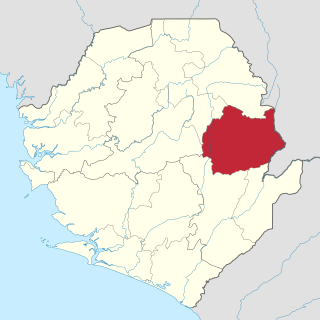
Kono District is a district in the Eastern Province of Sierra Leone. Its capital and largest city is Koidu Town. Motema is the second most populous city in the district. The other major towns in the district include Yengema, Tombodu, Jaiama Nimikor and Sewafe. The district is the largest diamond producer in Sierra Leone. The population of Kono District is 505,767. Kono District borders Kenema District to the southwest, The Republic of Guinea to the east, Koinadugu District to the northeast and Kailahun District to the southeast. Kono District is divided into fourteen chiefdoms.

Kenema District is a district in the Eastern Province of Sierra Leone. Its capital and largest city is Kenema, which is the third most populous city in Sierra Leone, after Freetown and Bo. Tongo is the second most populous city in the district. Other major towns in Kenema District include Blama and Yomboma. The district is the most populous district in the Eastern province with a population 609,873. Kenema District has an area of 6,053 km2 (2,337 sq mi) and comprises sixteen chiefdoms.

General elections were held in Sierra Leone on 11 August 2007. Seven candidates competed in the first round of the presidential election; no candidate received the necessary 55% of the vote to win in the first round, and a second round was held between the top two candidates, Ernest Bai Koroma of the All People's Congress (APC) and Solomon Berewa of the Sierra Leone People's Party (SLPP), on 8 September. According to official results, Koroma won the election with 54.6% of the vote.
Momodu Koroma is a Sierra Leonean politician. He is a former Minister of Foreign Affairs and a member of the Sierra Leone Peoples Party (SLPP). He became foreign minister in May 2002, as part of a new cabinet appointed following President Ahmed Tejan Kabbah's re-election earlier in the month. Koroma had previously been Minister of Presidential Affairs. Koroma was born in the small town of Yonibana in the Tonkolili District, his father was from the Temne ethnic group, while his mother came from the Mende ethnic group. It is very rare in Sierra Leone to see inter-ethnic marriages between Sierra Leone's two largest ethnic group the Temne and Mende.
Sierra Leone Progressive Independence Movement was a political party in Sierra Leone, led by Paramount Chief from Kono, Tamba Sungu Mbriwa. The party was founded in 1958, through the merger of the Kono Progressive Movement and the Sierra Leone Independence Movement. The objective of the party was, according to its founding declaration, to "prosecute more vigorously a political campaign for national unity and independence."
Kono Progressive Movement was a political party in Kono, Sierra Leone, that emerged in the mid-1950s with the backdrop of the expansion of diamond mining activities there are the growing feeling amongst a section of the Kono people that they were not reaping the benefits of the diamond boom. KPM was led by Tamba Sungu Mbriwa. The movement became part of the political opposition, as there was a break between it and the ruling Sierra Leone People's Party only a few months after the founding of KPM. Prominent figures in the area, such as Tamba Ngegba, J.S. Kpakiwa and T.R. Foyoh.

Alhaji Samuel Sidique Sam-Sumana is a Sierra Leonean politician who was the Vice President of Sierra Leone from September 17, 2007, to March 17, 2015. Sam-Sumana stood as the vice-presidential candidate of the All People's Congress (APC) in the 2007 presidential election, alongside presidential candidate Ernest Bai Koroma. The APC ticket defeated the Sierra Leone People's Party (SLPP) presidential candidate Solomon Berewa and vice presidential candidate Momodou Koroma. Sam-Sumana took office as vice president on September 17, 2007.

Dr Samura Mathew Wilson Kamara is a Sierra Leonean politician and economist. He was the All Peoples Congress (APC) Party's candidate for President of Sierra Leone in the 2018 election. He was the Minister of Foreign Affairs and International Cooperation of Sierra Leone from 2012 to 2017, Minister of Finance and Economic Development from 2009 to 2013, Governor of the Bank of Sierra Leone from 2007 to 2009, Financial Secretary in the Ministry of Finance during President Ahmad Tejan Kabbah's administration.

In April 1961, Sierra Leone became politically independent of Great Britain. It retained a parliamentary system of government and was a member of the British Commonwealth of Nations. The Sierra Leone People's Party (SLPP), led by Sir Milton Margai were victorious in the first general election under universal adult franchise in May 1962. Upon Sir Milton's death in 1964, his half-brother, Sir Albert Margai, succeeded him as Prime Minister. Sir Albert attempted to establish a one-party state had the ready cooperation of the opposition All People' Congress but met fierce resistance from some cadre within his party Sierra Leone People's Party (SLPP) and ultimately abandoned the idea.
Kaifala Marah is a Sierra Leonean politician, accountant, Governor of the Bank of Sierra Leone (2016-2017), and Minister of Finance (2013-2016). On March 7, 2017, Dr. Marah resigned as governor in order to seek the nomination of the All People's Congress (APC) for the Presidential election of 2018.
Chernor Ramadan Maju Bah also commonly known by his nickname Chericoco is Sierra Leonean lawyer and politician who is currently the leader of opposition since 2019 and previous held the position of Deputy speaker of parliament of Sierra Leone in the erstwhile government of Hon. Ernest Bai Korma and Parliamentary Chairman of the Mines and Minerals Resources Committee. He had also served as Chairman of the Parliamentarry Legislative Committee.
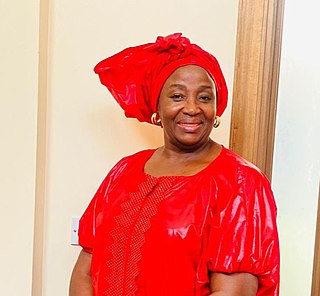
Diana Finda Konomanyi is a Sierra Leonean politician who has served as Minister of Lands, Country Planning and the Environment, Minister of Local Government and Rural Development in the erstwhile Government of President Ernest Bai Koroma. Prior to her ministerial appointment 'Iron Lady', was the Chairperson of the Kono District Council. after winning a landslide victory in a local government bye election in her home town of Kono District. Following the election of the All People's Congress (APC) and President Ernest Bai Koroma in 2007, Diana was appointed Board Chair of the Sierra Leone National Shipping Company
References
- 1 2 Hayward, Fred M. (1972). "The Development of a Radical Political Organization in the Bush: A Case Study in Sierra Leone". Canadian Journal of African Studies. 6 (1): 1–28. doi:10.1080/00083968.1972.10803654. JSTOR 484149.
- ↑ Minikin, Victor (1973). "Indirect Political Participation in Two Sierra Leone Chiefdoms". The Journal of Modern African Studies. 11 (1): 129–135. doi:10.1017/S0022278X00008119. JSTOR 159876. S2CID 154605049.